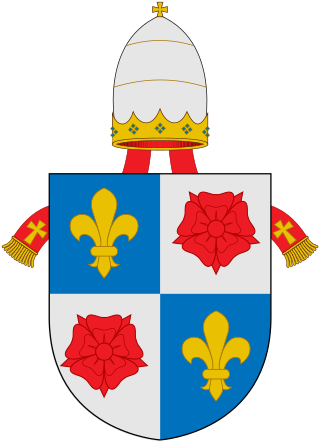
Pope Urban IV, born Jacques Pantaléon, was the head of the Catholic Church and ruler of the Papal States from 29 August 1261 to his death. He was elected pope without being a cardinal; he was the first to be elected in such a way, and this would occur for only 3 more popes afterwards.
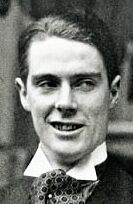
Anthony Dymoke Powell was an English novelist best known for his 12-volume work A Dance to the Music of Time, published between 1951 and 1975. It is on the list of longest novels in English.

A romance novel or romantic novel is a genre fiction novel that primary focuses on the relationship and romantic love between two people, typically with an emotionally satisfying and optimistic ending. Authors who have contributed to the development of this genre include Maria Edgeworth, Samuel Richardson, Jane Austen, and Charlotte Brontë.
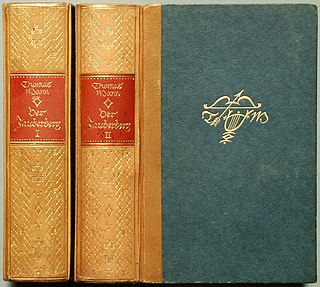
The Magic Mountain is a novel by Thomas Mann, first published in German in November 1924. It is widely considered to be one of the most influential works of twentieth-century German literature.

Michael Corleone is a fictional character and the protagonist of Mario Puzo's 1969 novel The Godfather. In the three Godfather films, directed by Francis Ford Coppola, Michael was portrayed by Al Pacino, for which he was twice-nominated for Academy Awards. Michael is the youngest son of Vito Corleone, a Sicilian immigrant who builds a Mafia empire. Upon his father's death, Michael succeeds him as the don of the Corleone crime family.
A bishōjo game or gal game is "a type of Japanese video game centered on interactions with attractive girls".
A book series is a sequence of books having certain characteristics in common that are formally identified together as a group. Book series can be organized in different ways, such as written by the same author, or marketed as a group by their publisher.

Tannhäuser is an 1845 opera in three acts, with music and text by Richard Wagner. It is based on two German legends: Tannhäuser, the mythologized medieval German Minnesänger and poet, and the tale of the Wartburg Song Contest. The story centres on the struggle between sacred and profane love, as well as redemption through love, a theme running through most of Wagner's work.

April Lady is a Regency romance by Georgette Heyer, published in 1957 by Heinemann in the UK and by Putnam in the US. Previously serialised in the Woman's Journal as “My Lady Cardross”, the new novel was Heyer’s forty-fourth book and her fifteenth Regency novel.
Romanticism arrived late and lasted only for a short but intense period, since in the second half of the 19th century it was supplanted by Realism, whose nature was antithetical to that of Romantic literature.
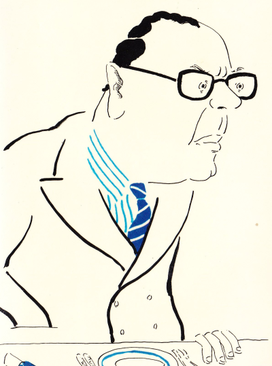
Kenneth Widmerpool is a fictional character in Anthony Powell's novel sequence A Dance to the Music of Time, a 12-volume account of upper-class and bohemian life in Britain between 1920 and 1970. Regarded by critics as one of the more memorable characters of 20th century fiction, Widmerpool is the antithesis of the sequence's narrator-hero Nicholas Jenkins. Initially presented as a comic, even pathetic figure, he becomes increasingly formidable, powerful and ultimately sinister as the novels progress. He is successful in business, in the army and in politics, and is awarded a life peerage. His only sphere of failure is his relationships with women, exemplified by his disastrous marriage to Pamela Flitton. The sequence ends with Widmerpool's downfall and death, in circumstances arising from his involvement with a New Age-type cult.

Afternoon Men is the first published novel by the English writer Anthony Powell. In its characters and themes it anticipates some of the ground Powell would cover in A Dance to the Music of Time, a twelve-volume cycle that spans much of the 20th century and is widely considered Powell's masterpiece.
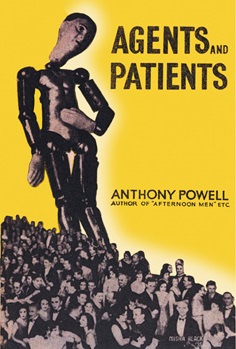
Agents and Patients is the fourth novel by the English writer Anthony Powell. It combines two of the aspects of 1930s life, film and psychoanalysis. In what Powell himself has acknowledged is a roman a clef of sorts, a comically critical eye is cast across entre deux guerres society and its often self-indulgent, usually unsatisfied quest for contentment.

Venusberg is a motif of European folklore rendered in various legends and epics since the Late Middle Ages. It is a variant of the folktale topos of "a mortal man seduced by the fairy queen visits the otherworld". In German folklore of the 16th century, the narrative becomes associated with the minnesinger Tannhäuser who becomes obsessed with worshipping the goddess Venus.
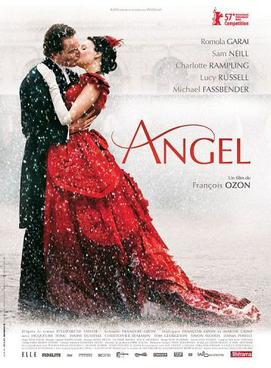
Angel, also known as the Real Life of Angel Deverell, is a 2007 British romantic drama film directed by François Ozon. It is based on the 1957 novel of the same name by Elizabeth Taylor, about the short life of a passionate young woman in Edwardian England for whom the fake world of the pulpy novels she writes replaces reality. The protagonist was portrayed by Romola Garai; other characters were played by Sam Neill, Michael Fassbender and Charlotte Rampling.

Dangerous Innocence is a 1925 American silent romantic comedy film written by Lewis Milestone and James O. Spearing based upon the 1923 novel Ann's an Idiot by Pamela Wynne. Directed by William A. Seiter for Universal Pictures, the film starred Laura La Plante and Eugene O'Brien.

Outlaw is the first novel of the eight-part Outlaw Chronicles series by British writer of historical fiction, Angus Donald, released on 10 July 2009 through Little, Brown and Company. The début novel was relatively well received.

Robert Watkin-Mills was an English bass-baritone concert singer of the late Victorian era who in his later career moved to Canada. An early recording artist, he recorded selections from the works of Schumann, Handel, Wagner, Gounod and Mendelssohn for Pathé Records (1903) and Odeon Records (1907-8).
Sebile, alternatively written as Sedile, Sebille, Sibilla, Sibyl, Sybilla, and other similar names, is a mythical medieval queen or princess who is frequently portrayed as a fairy or an enchantress in the Arthurian legend and Italian folklore. She appears in a variety of roles, from the most faithful and noble lady to a wicked seductress, often in relation with or substituting for the character of Morgan le Fay. Some tales feature her as a wife of either King Charlemagne or Prince Lancelot, and even as an ancestor of King Arthur.

The Antagonists is a 1964 suspense novel by the British author William Haggard published in England by Cassell and in the United States by Ives Washburn. It was Haggard's sixth of 21 books involving his protagonist Colonel Charles Russell, the urbane head of the unobtrusive but lethal Security Executive, a government counter-intelligence agency clearly based on the actual MI5 or Security Service, where he moves easily and gracefully along C. P. Snow's Corridors of Power in Whitehall. Like Haggard's earlier books it has standard elements of suspense thrillers along with detailed examinations of character, but in this case with more scenes of direct action and somewhat less dissection of character and motivation than in the first three books.















